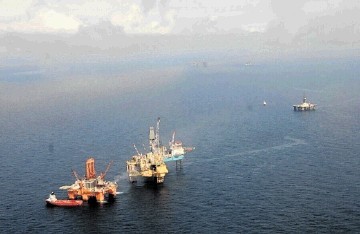
The operation to stop gas leaking from the Elgin platform in the North Sea is under way.
All 238 staff were evacuated from the Total installation – 150 miles off Aberdeen – when the leak was detected almost two months ago, on March 25.
At one point, about 7million cubic feet of gas was leaking from the platform every day but this was said to have been reduced by two-thirds when workers started drilling a relief well last month.
Total was granted approval from the Department of Energy and Climate Change (DECC) more than a week ago to “kill” the well by pumping heavy mud into it.
The operation started yesterday morning and Total said progress would be monitored for “a few days” to see if the intervention had worked. The firm said yesterday: “Total has started the planned well intervention operation to stop the leak from the G4 well on the Elgin complex.
“The well intervention operation got under way at 9.20am with the pumping of heavy mud into the well from the main support vessel, the West Phoenix semi-submersible drilling rig, via a temporary pipeline connected to the G4 wellhead.
“Depending on the precise conditions inside the well, the operation itself and the subsequent observation period will last a few days before it is possible to confirm whether the operation has been effective.”
Two options are being worked on by the company to stop the leak – blocking the well with mud and drilling a relief well to try to capture the gas. Experts have said pumping mud into the well is a cheaper and faster option but it could be more dangerous because it needs people to re-board the platform.
Dr Richard Dixon, director of environmental charity WWF Scotland, said: “Good luck to Total in stopping the gas leak from the Elgin platform. In nearly two months since the leak started, around 5,500 tonnes of the potent greenhouse gas methane has escaped, equivalent to adding around 45,000 extra cars on the roads of the UK for a whole year.
“The serious leak at the Elgin platform underlines the risks of the offshore oil industry, even in the familiar waters of the North Sea, and reinforces our concerns about riskier deepwater drilling in the Arctic. We should be trying to give up our addiction to oil and gas, not seeking it out in more difficult places.”
A DECC spokesman said: “We continue to monitor the situation closely and hope this operation successfully stops the gas.”